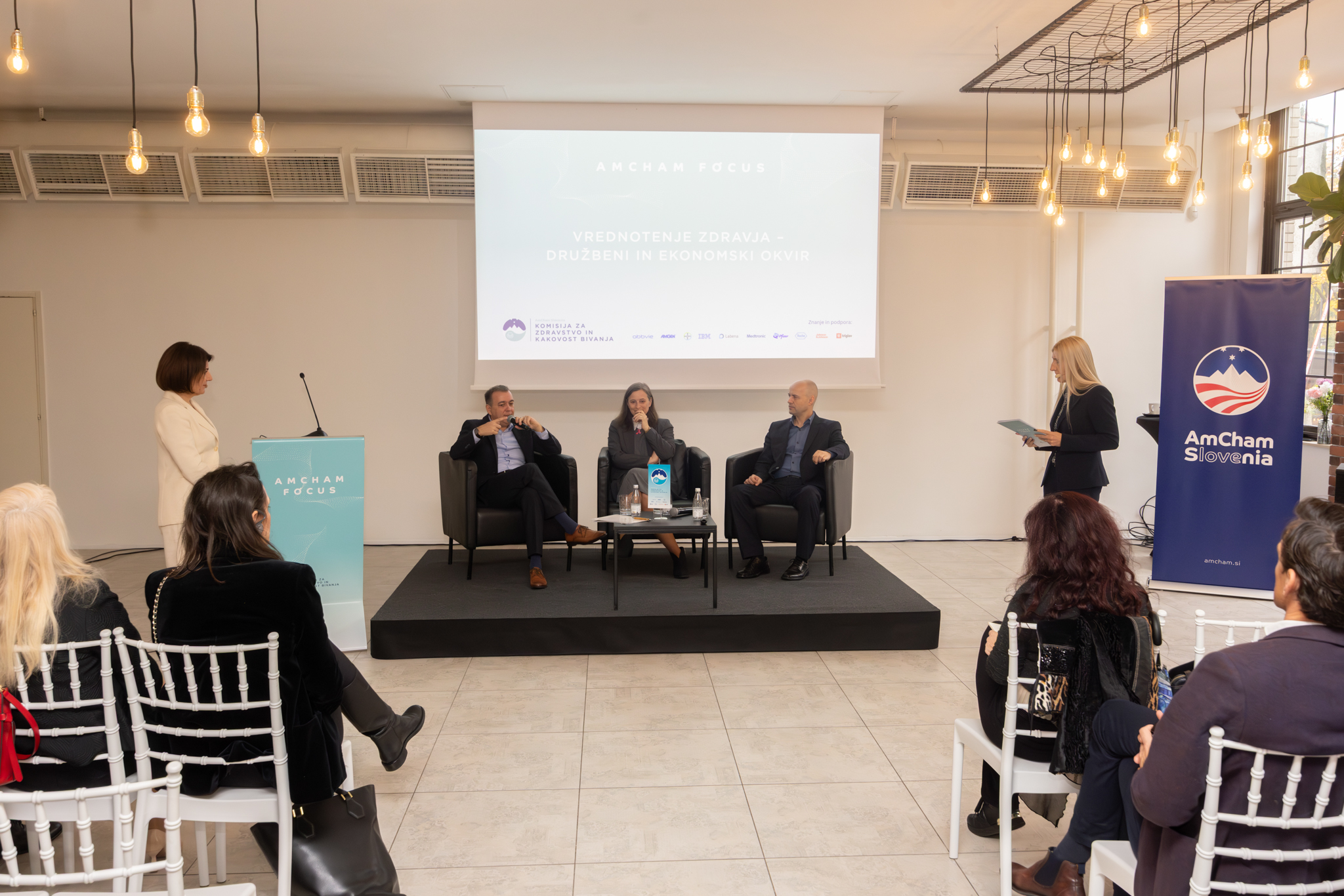Ljubljana, October 23, 2025 – At today’s AmCham Focus event, organized by the AmCham Health and Wellbeing Committee, speakers discussed one of the key topics for Slovenia’s future: health as an investment, not a cost — and how to ensure that Slovenia’s healthcare system remains sustainable, accessible, and efficient in the long run.
At the outset, participants emphasized that health is not an expense but an investment that, when managed well, pays off — for both individuals and society. However, the data show that there is still a long way to go: more than 78,000 patients in Slovenia are waiting unacceptably long for treatment, directly affecting productivity, development, and the competitiveness of the economy.
Guest speakers — Robert Ljoljo, MSc, Director General of the Health Insurance Institute of Slovenia (ZZZS); Tanja Španič, PhD, President of Europa Donna Slovenia; and Jože Sambt, PhD, Full Professor at the School of Economics and Business, University of Ljubljana — addressed key questions: how health impacts economic productivity, how to ensure access to advanced therapies, and how to shift the system toward preventive, data-driven, and value-based healthcare.
Prof. Jože Sambt, PhD, stressed that Slovenia should view health as an economic asset and systematically measure the effects of treatment and prevention on GDP. “Every euro invested in health is not a cost but an investment in the country’s future — in its productivity, sustainability, and quality of life. If someone recovers faster or stays healthy longer, this directly creates added value and contributes to the prosperity of society,” he said, highlighting the importance of data analytics that connect costs, treatment outcomes, and quality of life to prevent so-called ‘dead losses’ in the system.
Robert Ljoljo, MSc, underlined that Slovenia has enough funds to cover patients’ needs, though not all their wishes. “Our goal is for ZZZS to become a strategic investor in health, not just a payer of services. That’s why we’re introducing a new waiting-time management system and preparing pilot projects for a transition to a value-based care model — one that rewards quality and outcomes, not the quantity of services,” he explained, adding that it is essential to understand which services bring the greatest benefit to patients and society.
Tanja Španič, PhD, presented the patient’s perspective, emphasizing that waiting times are far more than mere statistics: “For someone waiting for an examination due to a suspected cancer diagnosis, months can mean a lost chance for recovery. The system must distinguish between urgent and non-urgent cases and ensure fair, data-driven treatment.” She also highlighted the importance of prevention, early disease detection, and trust in the healthcare system: “The DORA screening program is extremely successful — it already covers 85% of the most at-risk women. But prevention must become our shared responsibility. Currently, we invest only around 1.5% of the healthcare budget in prevention, which is too little if we want a healthy and productive society.”
The discussion also touched on the impact of absenteeism on the economy. According to NIJZ data, in 2023 more than 50,000 people were on sick leave every day — making “Sick Leave Ltd.” effectively the largest “company” in Slovenia. The cost of sick leave compensation has risen from €216 million to €620 million over the past decade.
Prof. Sambt, PhD, presented research on multiple sclerosis showing that more than half of the total disease-related costs are due to indirect productivity losses. He suggested that the state should introduce Health ROI analyses, enabling more informed planning of public funds.
Igor Lerman, General Manager Adriatic Cluster at IQVIA, presented an analysis of the Patients W.A.I.T. Indicator, showing that Slovenian patients wait an average of 600 days for new medicines to become available in the system — slightly above the European average. Despite this, Slovenia has above-average access to oncology therapies.
Tanja Španič, PhD, stressed that quality of life and long-term therapeutic effectiveness must also be taken into account when making decisions: “For a patient, 600 days can mean a lost opportunity for recovery, but the key lies in data — understanding which therapy truly brings value, and to whom.”
Mr. Ljoljo, MSc, added that ZZZS is already cooperating with the new Public Agency for Healthcare Quality, which will help standardize clinical guidelines and monitor treatment outcomes. “Only through high-quality data and clear standards can we ensure fair, safe, and effective patient care,” he emphasized.
The event concluded with a joint message from the speakers: health is the foundation of competitiveness and societal development. “If we want a next-generation healthcare system, we must embrace the paradigm that every euro invested in health is an investment in the future of our society. Dialogue and cooperation among all stakeholders are key to building trust and a stable system,” concluded the discussion.
